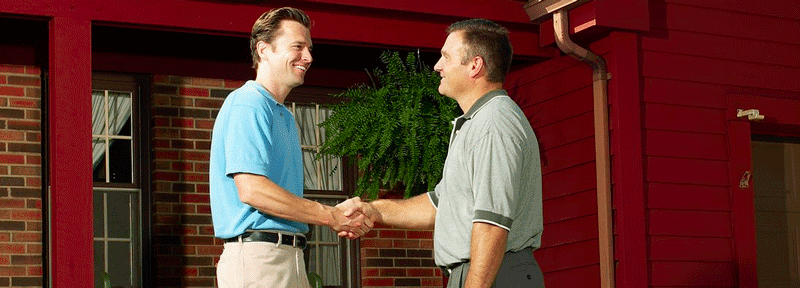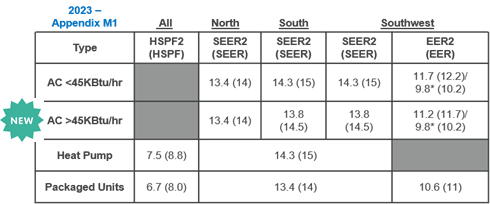
Client Conversations: 2023 HVAC Regulations and Explaining Them to Homeowners
Changes to energy efficiency standards are on the horizon, effective January 1, 2023. The Department of Energy (DOE) evaluates appliances every six years to determine whether minimum efficiency requirements and testing standards warrant change. In 2023, the minimum efficiencies for central air conditioners and heat pumps will increase and testing procedures will change as well.
New Efficiency Regulations
All regions (North, South, and Southwest) will increase by the equivalent of one SEER in 2023, which will result in a lower amount of electricity used for the same amount of cooling. The North will see an increase from 13 to 14 SEER, and the South and Southwest will increase from 14 to 15 SEER. Heat pumps will have a national increase from 14 to 15 SEER. This represents a 7-8% increase for SEER across all fronts.
You may notice the new labels will now list seasonal efficiency as SEER2. This is because of new testing procedures for HVAC systems. The new procedures take into account higher default external static pressure to better represent field conditions. Higher static requires higher watts, reducing the resulting numeric efficiency rating. As a result, in 2023, efficiency metrics will change and be labeled as SEER2, EER2, and HSPF2.


All new products will require testing to these new procedures and metrics in order to be manufactured and sold as of January 1, 2023.
Why Are These Changes Taking Place?
The DOE periodically evaluates current technology, its efficiency, and the cost of that technology to find the right balance. More efficient systems reduce the energy needed to heat and cool homes and businesses and therefore cost less to operate, but usually have a higher first cost.
Impact on Contractors
New, redesigned equipment will begin to make an appearance ahead of 2023 in order to coincide with the transition. Many of these systems will appear very similar to those available today. It is important to note that the 2023 requirements only apply to new systems, and existing systems will not need to be replaced if they are already installed and still function.
As with the last transition, the requirements are regional. Sell through of existing systems will be allowed in the North if the product was manufactured prior to January 1, 2023. This is not the case in the South and Southwest. Systems must comply with the 2023 federal minimums to be installed after January 1, 2023.
As a contractor, it is important to prepare for this change by making sure you are aware of the different federal minimum efficiency levels and compliance requirements across regions. Understanding the new standards and metrics (SEER2, EER2, HSPF2) will help both you and your clients feel confident moving forward with these changes. As 2023 approaches, you can ready yourself for the new efficiency requirements by learning the standards for your region and new technology specifics. The DOE website will contain useful materials on the topic, and your company and/or manufacturer may provide training courses or other resources to help you get up to speed.
As with previous standards, penalties will likely be implemented for non-compliance with the 2023 efficiency standards. The DOE will continue to enforce regulations, and instances of non-compliance will come at a cost to the manufacturers, distributors, and contractors. These penalties may include out-of-pocket equipment replacement or heavy fines for those caught selling or installing non-compliant equipment. To protect yourself and your business, keep detailed records of information pertinent to sales and models of equipment being installed.
Questions Homeowners May Have
When holding conversations with customers about the changes around the corner, you can help them feel at ease by being able to answer their questions. Be prepared to answer questions related to the following topics:
- What are the new 2023 HVAC regulations?
- Who is setting these new standards?
- What is SEER and how does it impact HVAC systems?
- What efficiency level is recommended for my region?
- Do I need to upgrade my current unit?
Like with all changes to the industry, it is vital that contractors keep up to date with new standards and not be caught unaware.
Read Next: 2023 DOE Efficiency Requirements: Are you regulation ready?


